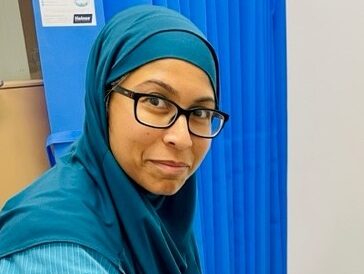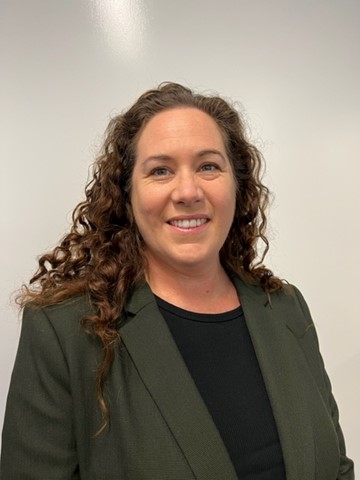Media Resources & Contact

Tanzina Sheikh’s first job in Australia was as a pathology collector (Phlebotomist) with NSW Health Pathology at our Prince of Wales Campus in 2005, and she hasn’t looked back.
Tanzina says she loves the work in a clinical hospital environment, her co-workers, and managers – she loves it all. Tanzina believes sharing knowledge is essential and trains new pathology teammates when they start.
So much so that Tanzina decided to go one step further and teach blood collection at a private college in her spare time.
“I learn when I teach students. They have so many questions; it keeps me on my toes, and I learn a lot from them just as they learn from my experience”.
Sharing experiences to teach others
Originally from Bangladesh, Tanzina and her husband crossed the Indian Ocean to NSW, Australia, for her husband’s work. She chose to study Pathology Collection Certificate III and later completed her Certificate IV.
Tanzina is passionate about sharing her experience and helping others, particularly women, realise their potential and how it’s possible to juggle work and family life. She says, “It’s great to see so many women in pathology. I advocate for wives and mums who don’t think they can do it all – work and look after their families.
“I tell them, ‘You can. You can do it; it just takes some organisation.’ I see lots of women, like me, from overseas who find the culture here so different.”
Consider a career in pathology
Tanzina advises anyone considering a career as a blood collector: “You have to be OK with needles and blood. It scares many trainees they might hurt people when they take blood.
“I tell my students, ‘Remember, you are helping to find the problem and the diagnosis so the doctors can treat the child.’ You must love communicating and talking to people all day – getting to know the kids and their families.
“You get to know their real life, not the rosy picture some people put on social media for the outside world, but the true authentic real life. And that’s so special.”
Paediatric collections are a specialism
Tanzina says, “The hardest thing about paediatric blood collection is finding the vein. When I first started, the senior nurses gave me some great tips on where to try as a last resort. I still use their tricks today and pass the technique on to my students.”
Sydney Children’s Hospital at Randwick is one of Sydney’s largest children’s hospitals. Kids come from all over NSW for specialised care. “I love working here. You need to know a lot of different conditions, like metabolic, renal and genetic diseases.”
Paediatric collections are unique and need a different skill set compared to adults, with the ability to empathise with the child but, most importantly, relate to the parents and make them feel at ease.
“When an adult is sick in hospital, it’s not nice, but when their child is unwell, it’s truly awful,” Tanzina says.
Collection challenges
Our collectors try to only get the minimum blood needed on the first attempt.
“It’s essential to gain the trust of the parents and carers, which can be challenging when a child is sick. Emotions are high. It takes time to earn and build rapport at such a stressful time. The parents might’ve just received some bad news, which you must be mindful of,” she says.
Some of the most challenging kids are those with special needs. Children with autism sometimes need extra time to become comfortable with new people. They often need two collectors, but Tanzina prefers to do it solo.
“I’m happy to take the time to make them comfortable with me, to feel relaxed. I ask them questions and learn things about them, making it easier to explain what I need from them.
“His mother was so pleased I could collect the blood on the first attempt.”
With such an excellent bedside manner, some parents ask for Tanzina by name, only wanting Tanzina to be their collector. “It’s that appreciation that keeps me going.”
Learning a new culture
One of the hardest things for Tanzina to learn when she moved to Australia was the difference in etiquette and how to handle different situations.
She quickly learned the importance of patient communication by watching senior hospital staff. “I learnt quickly to never take anything personally. You can learn from every experience. I’m still learning how to do things better, and that’s OK. We’re all growing all the time.”
Believe it or not, Tanzina used to be shy, with English not her first language. Still self-conscious of her language skills, she continues to learn. Tanzina is extremely proud of the life she has made for herself and the important work she does.
“I’ve moved house and now live much further away. I could transfer to another NSW Health Pathology location closer to home, but I’d miss it here. I’m happy to commute so I can stay at one of the biggest children’s hospitals in NSW.”
How to handle difficult situations and switch off
Some days are harder than others.
“You see some very sad situations, and switching off at the end of your shift can be difficult. You still feel it when you go home, but I try to keep myself busy. My 17-year-old son keeps me occupied.”
In her spare time, Tanzina spends time with family and friends and is happiest being active.
Back home in Bangladesh, Tanzina was a nutritionist, but her overseas qualification isn’t recognised in Australia. Though she planned to transfer her nutrition qualifications here at some stage, Tanzina says she enjoys pathology so much, the years have flown by.
Find all our career opportunities on our website.

